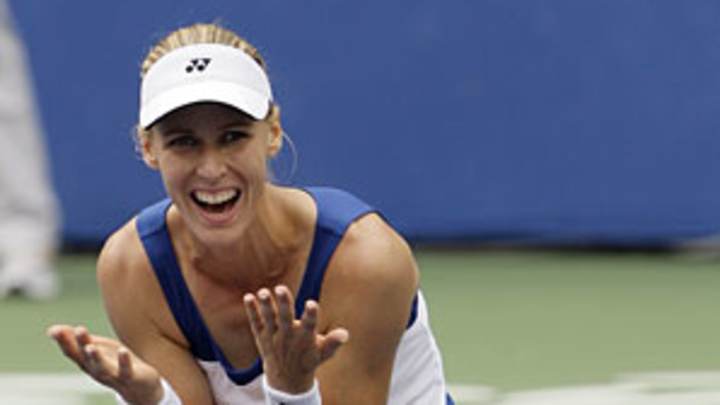Dementieva calls it quits

SI.com caught up with Sports Illustrated senior writer Jon Wertheim about Elena Dementieva's sudden retirement following Friday's season-ending loss to Francesca Schiavone at the WTA Championships in Qatar.
What was your first thought when you heard news of Dementieva's retirement?
It's an interesting tactic. For all the interminable retirement tours in women's tennis, this is the opposite tack. In retrospect, there's nothing crazy about it. At 29, she's at a certain age and stage of her career where it probably makes some sense, but the announcement was unexpected. This was not formally on the docket.
To what extent does Dementieva's longtime mantle of "Best Active Player Never To Win A Grand Slam" define her legacy?
Here's a player who was a U.S. Open semifinalist in 2000. Ten years ago, she came within a couple sets of playing for a Grand Slam title. So it definitely sort of dogged her throughout her career. In retrospect, there were some very winnable Grand Slam finals -- those losses to Anastasia Myskina at the 2004 French Open and Svetlana Kuznetsova at the '04 U.S. Open -- and it's too bad. Is she a Hall of Famer? Probably not, despite winning an awful lot of matches and an awful lot of titles. Winning a Slam just sort of elevates you to a different level.
She's just one of these people who sort of gives the tour heft. No scandals. No controversy. Just one of these well-liked figures, a delightful person. She had lots of Olympic success -- a silver medal in Sydney and the gold in Beijing -- which counts for something. She's won Fed Cup. She won just about everything you could win outside of the majors. But she never did close out that one Slam unfortunately. And it's really a shame, because in terms of the quality of her play and her matches and her wins at other events, she probably on paper should have won one or two.
Do you think it's fair to say her serve was a fatal flaw?
That was always the rap on her. She had absolutely world-class groundstrokes and athleticism, with sort of a club-player serve. But if you watched her play -- especially in the last five years or so -- it wasn't as if the opponent was teeing off on it. She wasn't getting broken any more than other players. I think it looked worse than it was.
Again, when you look and you see players like Myskina and Francesca Schiavone have won Grand Slams, it's both remarkable and sad that Dementieva never did. Truthfully, she lost a lot of close matches, including matches she should have won. She lost at times when she was right there and could have bagged career-changing victories, but she couldn't close those out. (Losing that match point against Serena in the 2009 Wimbledon semis stands out.) That's sort of the bittersweet part of this career: that if she'd been a little mentally tougher we'd be talking about her in a completely different light.
What enduring impressions do you have from covering her decade-plus career on the tour?
She used to play chess in the players' lounge with her brother. She was never sort of part of "the scene." Objectively, she could have traded on her looks, but she never sold out like that. She never had any interest in playing the sexpot role and it probably cost her a lot of money, but she kept her dignity.
A few days after the Beslan massacre in 2004, where more than 300 hostages were killed at a school in Russia, Dementieva lost the U.S. Open final and gave the most eloquent speech that referenced the tragedy. You lose a Grand Slam final -- that in restrospect you probably should have won -- and you still have the presence of mind to deliver a speech that touches on world events. There was always more going on there than just tennis. I think it's a real loss to the culture of the tour. The star power will survive but she's sort of like the worker in your office who everyone liked, who never got to be CEO but still was one of the pillars of the workplace. Ten years and you never heard a single pejorative word about her.

Jon Wertheim is a senior writer for Sports Illustrated and has been part of the full-time SI writing staff since 1997, largely focusing on the tennis beat , sports business and social issues, and enterprise journalism. In addition to his work at SI, he is a correspondent for "60 Minutes" and a commentator for The Tennis Channel. He has authored 11 books and has been honored with two Emmys, numerous writing and investigative journalism awards, and the Eugene Scott Award from the International Tennis Hall of Fame. Wertheim is a longtime member of the New York Bar Association (retired), the International Tennis Writers Association and the Writers Guild of America. He has a bachelor's in history from Yale University and received a law degree from the University of Pennsylvania. He resides in New York City with his wife, who is a divorce mediator and adjunct law professor. They have two children.
Follow jon_wertheim